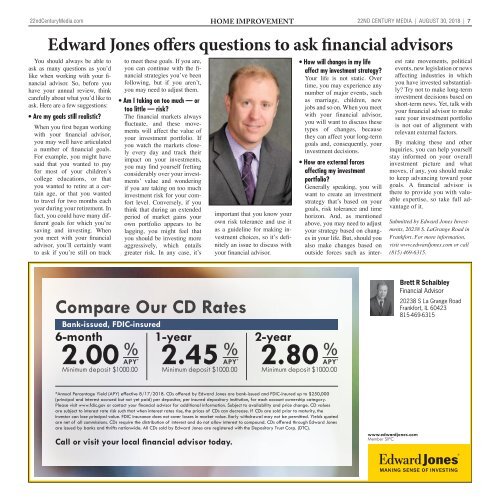SW_HI_ZC_083018
Create successful ePaper yourself
Turn your PDF publications into a flip-book with our unique Google optimized e-Paper software.
22ndCenturyMedia.com home improvement<br />
22nd century media | August 30, 2018 | 7<br />
Edward Jones offers questions to ask financial advisors<br />
You should always be able to<br />
ask as many questions as you’d<br />
like when working with your financial<br />
advisor. So, before you<br />
have your annual review, think<br />
carefully about what you’d like to<br />
ask. Here are a few suggestions:<br />
• Are my goals still realistic?<br />
When you first began working<br />
with your financial advisor,<br />
you may well have articulated<br />
a number of financial goals.<br />
For example, you might have<br />
said that you wanted to pay<br />
for most of your children’s<br />
college educations, or that<br />
you wanted to retire at a certain<br />
age, or that you wanted<br />
to travel for two months each<br />
year during your retirement. In<br />
fact, you could have many different<br />
goals for which you’re<br />
saving and investing. When<br />
you meet with your financial<br />
advisor, you’ll certainly want<br />
to ask if you’re still on track<br />
to meet these goals. If you are,<br />
you can continue with the financial<br />
strategies you’ve been<br />
following, but if you aren’t,<br />
you may need to adjust them.<br />
• Am I taking on too much — or<br />
too little — risk?<br />
The financial markets always<br />
fluctuate, and these movements<br />
will affect the value of<br />
your investment portfolio. If<br />
you watch the markets closely<br />
every day and track their<br />
impact on your investments,<br />
you may find yourself fretting<br />
considerably over your investments’<br />
value and wondering<br />
if you are taking on too much<br />
investment risk for your comfort<br />
level. Conversely, if you<br />
think that during an extended<br />
period of market gains your<br />
own portfolio appears to be<br />
lagging, you might feel that<br />
you should be investing more<br />
aggressively, which entails<br />
greater risk. In any case, it’s<br />
important that you know your<br />
own risk tolerance and use it<br />
as a guideline for making investment<br />
choices, so it’s definitely<br />
an issue to discuss with<br />
your financial advisor.<br />
• How will changes in my life<br />
affect my investment strategy?<br />
Your life is not static. Over<br />
time, you may experience any<br />
number of major events, such<br />
as marriage, children, new<br />
jobs and so on. When you meet<br />
with your financial advisor,<br />
you will want to discuss these<br />
types of changes, because<br />
they can affect your long-term<br />
goals and, consequently, your<br />
investment decisions.<br />
• How are external forces<br />
affecting my investment<br />
portfolio?<br />
Generally speaking, you will<br />
want to create an investment<br />
strategy that’s based on your<br />
goals, risk tolerance and time<br />
horizon. And, as mentioned<br />
above, you may need to adjust<br />
your strategy based on changes<br />
in your life. But, should you<br />
also make changes based on<br />
outside forces such as interest<br />
rate movements, political<br />
events, new legislation or news<br />
affecting industries in which<br />
you have invested substantially?<br />
Try not to make long-term<br />
investment decisions based on<br />
short-term news. Yet, talk with<br />
your financial advisor to make<br />
sure your investment portfolio<br />
is not out of alignment with<br />
relevant external factors.<br />
By making these and other<br />
inquiries, you can help yourself<br />
stay informed on your overall<br />
investment picture and what<br />
moves, if any, you should make<br />
to keep advancing toward your<br />
goals. A financial advisor is<br />
there to provide you with valuable<br />
expertise, so take full advantage<br />
of it.<br />
Submitted by Edward Jones Investments,<br />
20238 S. LaGrange Road in<br />
Frankfort. For more information,<br />
visit www.edwardjones.com or call<br />
(815) 469-6315.<br />
Compare Our CD Rates<br />
Bank-issued, FDIC-insured<br />
6-month<br />
%<br />
2.00APY *<br />
Minimum deposit $1000.00<br />
1-year<br />
%<br />
2.45APY *<br />
Minimum deposit $1000.00<br />
2-year<br />
%<br />
2.80APY *<br />
Minimum deposit $1000.00<br />
Brett R Schaibley<br />
Financial Advisor<br />
.<br />
20238 S La Grange Road<br />
Frankfort, IL 60423<br />
815-469-6315<br />
*Annual Percentage Yield (APY) effective 8/17/2018. CDs offered by Edward Jones are bank-issued and FDIC-insured up to $250,000<br />
(principal and interest accrued but not yet paid) per depositor, per insured depository institution, for each account ownership category.<br />
Please visit www.fdic.gov or contact your financial advisor for additional information. Subject to availability and price change. CD values<br />
are subject to interest rate risk such that when interest rates rise, the prices of CDs can decrease. If CDs are sold prior to maturity, the<br />
investor can lose principal value. FDIC insurance does not cover losses in market value. Early withdrawal may not be permitted. Yields quoted<br />
are net of all commissions. CDs require the distribution of interest and do not allow interest to compound. CDs offered through Edward Jones<br />
are issued by banks and thrifts nationwide. All CDs sold by Edward Jones are registered with the Depository Trust Corp. (DTC).<br />
Call or visit your local financial advisor today.<br />
www.edwardjones.com<br />
Member SIPC


















